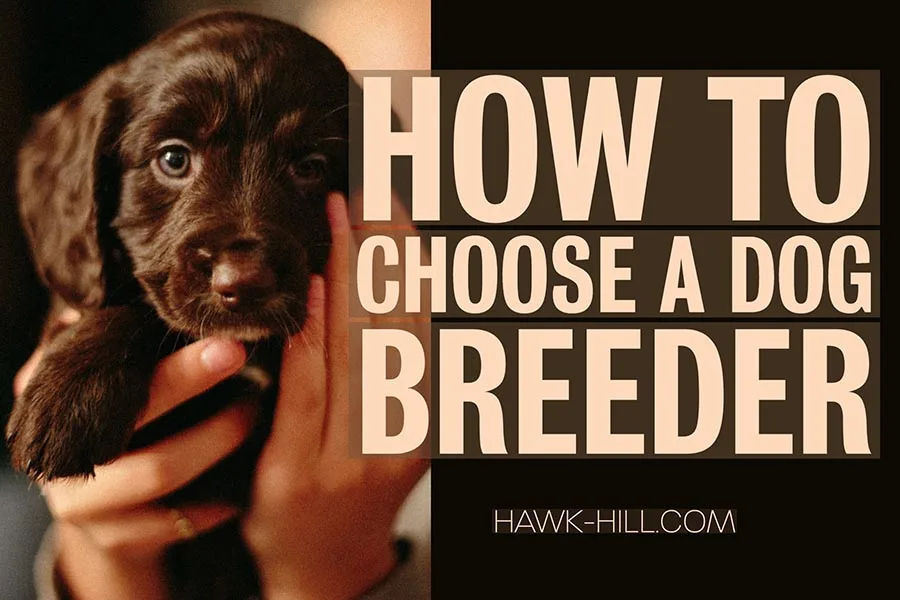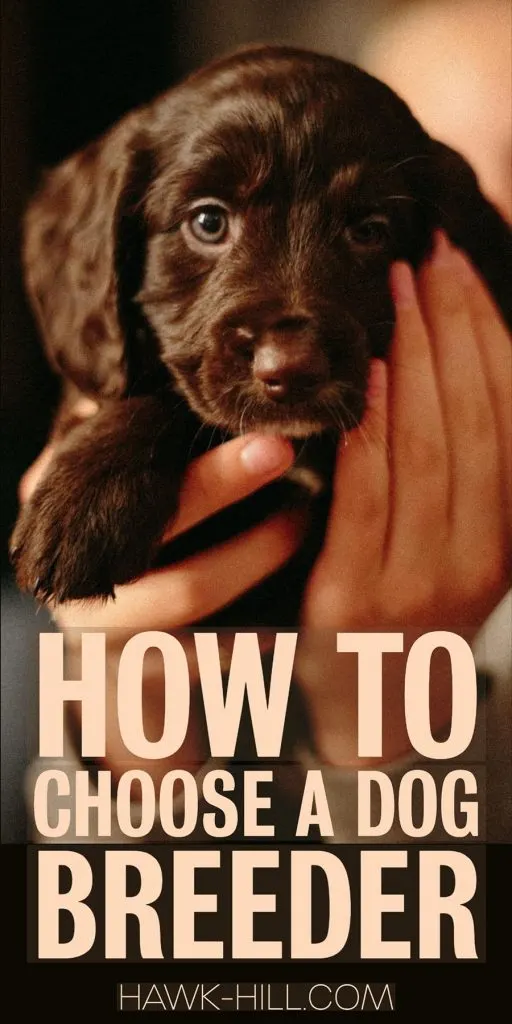Buying a puppy is different from buying just about anything else.
If you choose the right dog breeder you’ll have access to a wealth of information, support, and free training advice for the life of your dog.
The Place of Breeders in a Pro-Rescue Context
While acquiring a dog through breed rescue is preferable to many, purchasing a dog through a reputable breeder has its place.
Good breeders maintain health, standards, and generations of tradition. For over 2,000 years, according to the history of the Saluki breed, breeders worked to breed dogs for specific purposes. When responsible puppy buyers pair with responsible breeding practices, these curated lineages are preserved and specific dog breeds can continue to produce dogs with a specific range of appearances, skills, and personalities.
If you’ve made the choice to acquire dog a through a breeder for a reason, now it’s time to do your homework selecting a responsible breeder.
Tips for Choosing a Dog Breeder
Here are some ways to tell the difference between responsible breeders that deserve to be supported in their work to preserve the breeds we know and love, and irresponsible breeders who may not be breeding with a noble goal in mind:

Questions to ask a dog breeder before buying a puppy:
Do you compete with your dogs in conformation or performance events?
Through competing in conformation or dog-sport events a breeder has the opportunity for an objective expert to judge of the dogs obedience, confirmation, or performance. A really good breeder plans litters that have at least one, and preferably two, parents who have won a title in conformation, or performance events, or proved themselves as working or service dogs.
Conformation titles prove the dog has been judged as physically matching breed standards (helping ensure you get a dog that actually looks like the breed) while performance titles (agility, obedience, flyball, etc) prove the dog is healthy physically and mentally and is able to be trained.
Do you belong to any dog-related clubs or organizations?
Membership in organizations indicates that your breeder is keeping up to date on best practices for breeding, breed information and dog handling methods, and is professionally linked with other breeders.
What health guarantees does the breeder have on their puppies?
A good breeder will state in their contract that the puppy will not have genetic medical problems at any point in his life, and if it does there will be compensation available. Some breeders will only offer a “replacement puppy” that you can exchange your dog for if your dog shows a genetic disorder. These breeders are banking on you being too attached to your pet to rehome your dog and take advantage of this offer. Instead, look for (or negotiate for) refunds of the purchase price offered if the dog proves to have genetic health issues.
In addition to these questions above, look out for these red flags
🚩 Red Flag #1: The breeder offers to let you take your puppy home at 6 or 7 weeks old.
Why? Puppies learn important socialization by remaining with their mother and littermates for 8-12 weeks. Veterinary research indicates that when a puppy stays with its mother and siblings till 8-12 weeks, the puppy will learn how to socialize in a pack (a big benefit at a modern urban dog park), learn appropriate play from its siblings, and bite inhibition from its mother.
By 10-12 weeks the puppy will have a solid start on being housebroken by watching and following its mother. A breeder willing to wean at 6 weeks may indicate a lower level of commitment on the breeder’s part or profit-focused breeding practices requiring puppies to be sold quickly to free space for another litter already on the way.
🚩 Red Flag #2: A breeder who picks a puppy for you without interviewing you.
Some breeders will pick a puppy for you- or give you a choice of only a few of the puppies in the litter, I covered this in my how to pick a puppy from a litter article. This is a common practice among responsible breeders. Good breeders may do this because they know their puppies best, and after getting to know your needs they can match puppies with appropriate families.
Good breeders also often keep one or two puppies from each litter for a few months to evaluate the dog’s potential to be shown. You should be concerned if the breeder picks a puppy for you before you ever tell the breeder about your lifestyle and the activities you plan to share with your dog- as without this information, puppy assignment may be for their benefit and not yours.
🚩 Red Flag #3: Not being allowed to see all the puppies in the litter or the breeder’s home.
You should be able to visit and meet all available puppies, the mother, and see their living environment. If a breeder wants to meet you with all the puppies in a pen on their lawn, be curious about what the indoor living conditions might be. All puppies should be healthy and bright-eyed- though even the healthiest mama dog may look haggard after caring for all her puppies for two months.
The area where the dogs are kept should be inside the home in a clean area that seems well maintained. The puppies should be being encouraged to go outside with their mother to go to the bathroom. (It’s highly unlikely your puppy will be housetrained, but if the litter has been kept in a kennel and not observed and followed the mother in and out to use the restroom, you’ll be starting from square one with potty training your puppy.)
🚩 Red Flag #4: Puppies kept in cages or outdoors.
Always and only buy from a breeder who lives with their dogs. No matter how clean the kennels or cages are, it is my opinion- as someone who spent over a decade professionally affiliated with this industry- that it is impossible to breed healthy, well socialized puppies who are ready to thrive in their new home when the mother and puppies are isolated outside of the home and away from people.
If the puppy is to be sold as an indoor pet, puppies should have exposure to indoor living and human interaction frequently during the early weeks of its life. It is, of course, necessary to confine curious puppies, but pet gates, closed doors, welping boxes, and even grarages should be used in place of cages, candles, or barns. Never buy from a breeder whose dogs are “outdoor dogs” only. Outdoor Dogs are less socialized, and breeding outdoor-only dogs can produce puppies that struggle to socialize with humans and may ultimately have to be dogs that are rehomed through a breed rescue.
Something to Consider: Are Both Parents on site?
Some advice on picking a puppy will advise you to meet and examine both parents, but in a good breeding operation, this often is not possible. If a breeder is carefully breeding the best to the best, it’s unlikely they will be lucky enough to own both the male and female. Even if the information isn’t useful to you, ask for a several-generation pedigree on the sire and dam. Your breeder probably won’t recall it from memory, but they should have access. It’s a good sign if the breeder is able to access it quickly, or off the top of their head – this indicates that the breeder is familiar with the pedigree and is mindful of the bloodlines they are breeding.
Picking up your new puppy
Picking up your puppy is a big day! Most people are totally focused on getting that wiggly little pup in their arms and setting off into a new life as pet parents! But don’t head off too quickly, a good breeder should provide you the following, at minimum, on pickup day or in advance of the big day:
What you should receive when you pick up your puppy:
- AKC registration slip. You will select a name for your puppy and submit this form to AKC, with a fee, to register the pup in your name.
- A record from a veterinarian indicating what shots the pup has and when the puppy was wormed.
- Three to seven days worth of the puppy food the pup is used to eating. This prevents issues with upset stomachs in response to a sudden change in food.
Get your new puppy accustomed to using a doggie door as soon as they are young enough to be outside alone.

